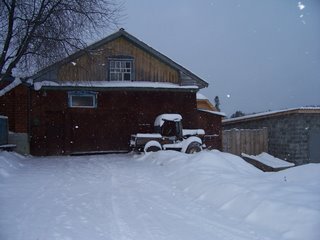Word of the Day: Замерзла

Замерзла (pronounced za-myerz-la) v. 1. English translation: Frozen. 2. The most common question asked in
Usage: Tyi ne zamyerzla? [Are you freezing?].
Da, zamyerzla. [Yes, I am frozen].
Vot blin, ya sovsem zamyerzla. [Dang it, I’m completely frozen].
Yes indeed, winter has arrived. And with it, about two feet of snow and regularly sub-zero temperatures. After weeks of snow and rain and snow and rain mixed with constantly fluctuating temperatures and muddy streets, winter came suddenly and seems to have settled in for a few months. We went to sleep one night and woke up the next morning and it was -23 degrees Celsius and the outside world was completely замерзло. Lucky for us, we also woke up to discover that the pipes in the dorms were замерзли. Consequently, we were замерзли like nothing else. I walked around in six layers of clothing, tried to keep warm with a blow dryer, and drank ten cups of tea a day. Fortunately, due to the gradual melting of our pipes and the impressive initiative of Josefina [who insulated and glued shut all of our windows], our rooms have now reached a livable temperature. Now it’s just dealing with the outside world that we’re working on : )
Замерзла is one of my favorite Russian words because it is used so often and because as a foreigner, I have been asked the question since September. Betsy, are you cold? Betsy, you must be frozen! Betsy, this weather is cold for you, yes? [when the temperature is a good 15C]. This plays into two exceptional characteristic of most Russian people: their obsession with discussing health [and assuming that if one is cold, then she will surely be sick within hours] and their incredible concern for the well-being of foreigners. When the frost hit two weeks ago, I was almost glad to finally be able to answer “Da, замерзлa.”

2 Comments:
Betsy, what is the masculine form of zamyerzla? ie how can I be zamyerzla too?
MG
nope, you're just "zamyerz". myi vsye zamyerzli. and in the winter in russia, vsyo zamyerzlo.
that concludes today's grammar lesson :)
p.s. mike, if you send me your address, i'll get the next russian postcard installment off...
Post a Comment
<< Home